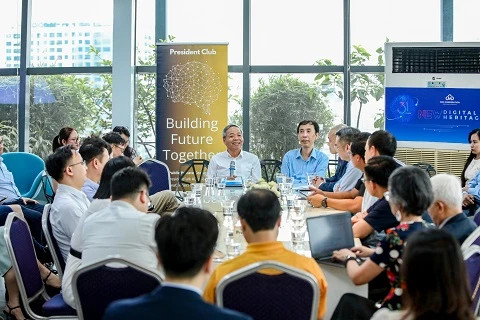Private economy: From “component” to “the most important driving force”
Speaking at the discussion, Nguyen Trung Chinh, Chairman of the Board of Directors and Executive Chairman of CMC Group, who directly participated in the Resolution Editorial Team, emphasised: “Resolution No.68 represents a breakthrough in ideology when for the first time the private economic sector is identified as “the most important driving force” for the country’s development. If implemented in the right direction, most of the current bottlenecks will be removed”.
Chinh said that the intensity of the work during the document drafting process far exceeded any stage he had ever experienced. The authorities, especially the civil servants, worked with a determined and persistent spirit, which is commendable.
According to Dr Vo Tri Thanh, Director of the Institute for Brand Strategy and Competition (BCSI), the issuance of Resolution No.68 is a major shift from the concept of considering the private sector as “a part” to a central position in the development strategy.
At the discussion, delegates shared many real-life stories that are barriers to developing private enterprises. Nguyen Hoa Binh, Chairman of NextTech, cited that implementing the legal framework for e-wallets took up to 8 years due to changes in management thinking. When the policy was issued, the regulation required the CEO to have experience in the banking industry, which eliminated innovators from the game.
Dao Xuan Dung - Chairman of UHY Auditing and Consulting Company, raised the story of a business leader being banned from leaving the country just because of late tax payment of tens of millions of VND. This inflexible regulation causes difficulties and troubles, but can sometimes cause the company’s stock price to collapse due to small accounting errors. Dung also warned about billions of VND being wasted due to projects not being transferred because of legal barriers.
Lawyer Bui Van Thanh shared another story about the impact of inflexible regulations, when a business spent a whole year applying for permission to print packaging because it was classified as a “publishing activity”.
In addition, the conflict-of-interest situation in the financial system was also discussed. Nguyen Ngoc Ha, National Financial Supervision Committee, warned that banks that lend and own securities companies act as brokers, consultants and valuers, leading to the risk of market manipulation, while private enterprises have difficulty accessing real capital flows.
Creating together: Strengthening public-private synergy for sustainable development
The atmosphere at the discussion showed a positive movement: the private sector no longer waits for policies issued from above, but has proactively contributed, proposed and accompanied the State in each implementation step.
CMC, MISA, 1Office and Giovanni raised issues and proposed specific mechanisms, action plans and commitments for implementation. Dr Vo Tri Thanh recommended that businesses strengthen cost-benefit analysis and policy impact assessment to provide more effective feedback.
Lawyer Bui Van Thanh proposed developing a transparent national information portal on investment opportunities. Dang Huy Dong, former Deputy Minister of Planning and Investment, emphasised: “Sandbox needs to be controlled by space-time-risk, but should not constrain creativity with conservative conditions”.
Le Viet Thang, General Director of 1Office, proposed: “The government should allocate a budget to buy Vietnamese software to provide for free to new businesses under 3 years old. We do not ask for financial support, we just need to put tools in the hands of businesses”.
Nguyen Xuan Hoang - Vice Chairman of MISA Company expressed his wish that the draft laws, when passed, need to be clear, and when coming into effect, they can be applied immediately, limiting the situation of pushing responsibility to decrees and circulars.
It can be affirmed that Resolution No.68-NQ/TW, with its strong innovative spirit, has opened up a new policy space for the private economic sector. To transform the policy into reality, it will require a process of cooperation and joint efforts, not only from the State, but also from the business community, experts and society.
The discussion continued to acknowledge the role of the President Club - a model of public-private partnership connecting business leaders, former politicians and leading policy experts in many fields to promote in-depth discussions and focused actions. This will be an effective bridge between the public and private sectors, between political will and market demands.
















